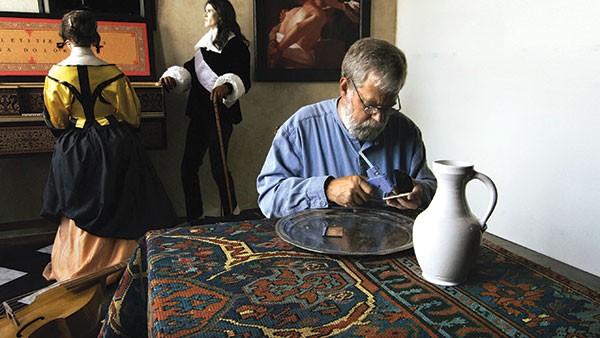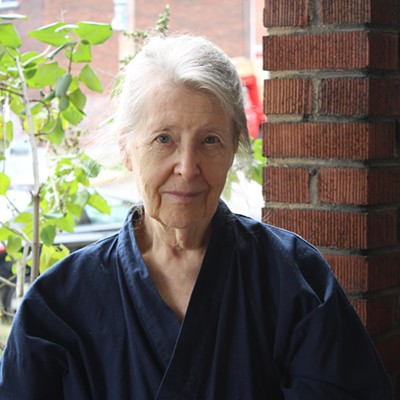At the outset of the film, Tim Jenison announces: "I'm going to try to paint a Vermeer. ... It will be pretty remarkable if I can, because I'm not a painter."
Tim's Vermeer is a Penn & Teller documentary — Penn Jillette produced and narrates, Teller directs — and you might wonder why a pair of magicians is interested in a middle-aged computer-graphics guy in Texas trying to mimic the distinctive painting style of the 17th-century Dutch painter.
But the film is also an enquiry, a scientific investigation into how Vermeer might have produced the exquisite detail and extraordinary depictions of light in his works. Vermeer left behind no documentation on his process; there aren't even sketches beneath his paint. But could Vermeer have used "trickery," optical devices like lenses or a camera obscura, to achieve his photo-realistic effects? A tinkerer at heart, Jenison stumbles onto a painting-via-mirror technique he thinks Vermeer might have used. He thus sets out to prove it, by meticulously recreating Vermeer's "The Music Lesson."
Jenison does research, enlisting the opinions of both Martin Mull (yes, the comic actor) and artist David Hockney. He visits Delft, where Vermeer painted, and Buckingham Palace. (The Queen owns the original.) Back in San Antonio, Jenison constructs a facsimile of Vermeer's studio in a warehouse, and hand-crafts all the objects depicted in the painting. Using only materials and techniques available to Vermeer, he fashions lenses and grinds paint.
Then, he begins painting. For months. (Jenison: "If Vermeer [used this method], it wasn't a time-saver.") And understandably, here's where the intrigue of the film begins to flag. Watching someone paint is just a brush stroke up from watching paint dry.
Penn and Teller are noted skeptics and enthusiastic supporters of science used in the creation of art and illusion. I get why they'd be fascinated with Jenison's experiment, which seeks to explain with provable facts the unexplainable quality of Vermeer's paintings. But I'm surprised the pair didn't round out their doc by inviting some snooty art experts to argue the "magical creative" side of art. Or an art historian claiming that any use of optics nullifies what we consider masterful painting. How could they miss the fun of debunking such highbrows!
Jillette and Jenison briefly offer their shared opinion: If Vermeer did use optics, then he's an even bigger genius! But the film misses an opportunity to create a better context for how controversial this project might be, or simply to argue the never-resolved: What is great art, and who decides? Jenison's Vermeer project is pretty amazing — especially if you dig a window into people's obsessions — and, I reckon, you can take the art argument to the bar afterward.














